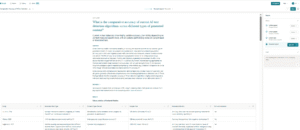You don’t need “more AI.”
You need tools that plug into your funnel, respect your brand, and move real numbers—not vanity dashboards.
This guide provides you with that.
| Tool | Summary | Best for | Key features | Watch-outs | Pricing snapshot* |
|---|---|---|---|---|---|
| AdCreative.ai Gen-AI Ads Generator |
AI-first ad creative platform for banners, short videos, ad copy, and product “AI photoshoots,” plus creative scoring. | Rapidly producing many ad variants across Meta/Google/TikTok/display. | Multi-size ad creatives AI product photoshoots Short-form video Ad text generator Creative scoring |
Credit limits on lower tiers Enforce brand voice with QA Read plan terms carefully |
~$39 Starter, ~$249 Pro, up to ~$599; free trial. |
| Anyword Gen-AI Copy Optimizer |
Performance-driven copy with a Predictive Performance Score and real-time, data-guided editing. | Prioritizing ad/landing page variants before spend; scoring loop in writing. | Predictive Performance Score Data-Driven Editor Content Intelligence Website messaging tests/personalization |
Scores are guides; still test live Best value in higher tiers; allow onboarding time |
Starter ~$39/mo; Data-Driven ~$79–$99/mo; Business/Enterprise custom. |
| FeedHive Gen-AI Social Media Writer |
AI-forward scheduler that helps ideate, write, automate, and publish across major social channels. | Daily posting teams that want automation, approvals, and grid planning. | AI Writing Assistant (social-tuned) “Vibe” tone consistency Automation rules (e.g., auto-comments) Smart scheduling & cross-posting |
Lighter governance than enterprise suites Mind recycled-post repetition |
Creator→Agency ~€19–€299/mo; free trial. |
| SEO.AI Gen-AI SEO Writer |
SEO writing + on-page optimization in one editor with real signals (SERP, GSC, internal linking). | Shrinking “brief → draft → optimize” handoffs; programmatic SEO. | SEO Score editor Brand voice training Semantic/keyword research One-click meta & internal links GSC integration; bulk gen |
Still do EEAT/fact checks Do voice setup to avoid generic tone |
Basic $49/mo; Plus $149/mo; Enterprise $749/mo. |
| Copy.ai Gen-AI Content Workflows & Agents |
Workflow/agent platform to codify content processes (research → brief → draft → distribute). | Teams with repeatable content motions at scale. | Workflows Content Agents Brand Voice, Tables, Actions Multi-model choice |
Quality depends on process/data Workflow credits can constrain heavy use |
Chat from $29/mo; Agents from $249/mo; higher tiers ~$1k–$3k/mo. |
| HeyGen Gen-AI Video Generator |
Avatar + translation video studio for fast explainers, sales intros, and multilingual spots. | Quick, on-brand videos without heavy production. | Stock/custom avatars Interactive avatars (Creator+) 175+ language translation minutes Free plan (limited videos) |
Outputs can feel templated without b-roll/scripting Plan translation/avatar minutes |
Free tier; paid plans with translation minutes (check live page). |
| ElevenLabs AI Voice / Video Translator |
High-quality TTS, cloning, dubbing, and multilingual voice for ads, product videos, and localization. | Broadcast-ready VO and scalable dubbing/localization. | Text-to-Speech & cloning Dubbing studio Agents & music tools API access |
Mind character/minute quotas Use consent/brand-safe voices Some control needs prompt skill |
Free tier; Starter/Creator/Pro/Scale; dubbing priced per minute. |
| Byword Gen-AI Programmatic SEO |
Generate high-quality articles at scale from keywords/templates/feeds for topic clusters. | Long-tail/topic cluster throughput with predictable unit cost. | Bulk/article generation Templates & consistent structure Credits designed for scale |
Not a full content OS Bring strong briefs and do QA/fact-checks |
PAYG from $5/article; plans $99 / $299 / $999 per month. |
| Photoroom Gen-AI Product Studio |
AI image studio for marketplace-ready product photos, staging, virtual models, batch edits, and API. | Catalog-scale imagery and multi-channel merchandising. | Background remover + AI scenes Product Staging & Virtual Model Batch Mode, Teams, API Enterprise options (SOC 2) |
Heavy art direction still external Tiered export/feature limits; forecast usage |
Free, Pro, Max, Enterprise (region-specific pricing). |
| Mutiny Gen-AI Website Personalization (B2B) |
No-code personalization for B2B growth; turn intent signals into on-site experiences and LinkedIn ads. | ABM/mid-funnel pipeline from ICP segments; fast on-site tests. | AI copy & experiences by segment LinkedIn activation Playbooks and testing |
Best for B2B/higher ACV Needs clean segments & offers Deeper attribution via your stack |
Custom/quote-based. |
| Blueshift Gen-AI CDP / Engagement Platform |
Customer engagement platform combining CDP-grade data, omnichannel orchestration, and predictive/generative/agentic AI. | Replacing ESP+CDP+reco stack; 1:1 targeting across channels. | Predictive segments & next-best action Recommendations Omnichannel journeys & testing Gen/agentic creative helpers |
Heavier onboarding Needs data owner/clean schema Top features on annual plans |
Public starters around ~$1,250/mo; confirm package. |
| Spectrm Gen-AI SMS & DMs Writer |
Conversational marketing on WhatsApp, Messenger, and Instagram DMs to capture zero-party data and drive sales. | Paid-to-DM funnels; list growth and re-engagement via messaging. | LLM chatbots for guided shopping Multi-channel messaging CRM/ESP sync for downstream campaigns |
Mind opt-in/compliance Bot design & copy matter Requires ongoing optimization |
Quote-based. |
| Recraft Gen-AI Visual (Vector/Raster) |
Generate logos, icons, illustrations, and branded assets; exports clean SVG for designers. | Fast, brand-consistent graphics you can edit in your design stack. | AI vector generator w/ SVG export Raster generation & editing Daily free credits; paid top-ups |
Still need design eye May take several passes Plan around credit cadence |
Free (~30 daily credits); paid plans available. |
|
ChatGPT (Business / Enterprise) All-in-one Gen-AI Content Generator |
General AI workspace for research, briefs, drafts, sheet help, and light analysis with admin-controlled sharing. | Centralizing brand voice, references, and prompt libraries for non-technical teams. | SAML SSO, MFA, admin console (Business) SCIM, RBAC, analytics, data residency (Enterprise) Connectors, Projects/Tasks/Canvas, Deep Research |
Enterprise has stronger governance features Still set brand guardrails inside Projects |
Business $25/user/mo (annual) or $30 (monthly); Enterprise custom. |
| Clay AI-Agent Lead Generation |
Growth OS: compose tables, wire 100+ data sources, and let Claygent research/enrich and draft first-pass outreach. | Repeatable GTM at scale (research → enrich → personalize → push to CRM/sequencer). | Claygent research/scrape Multi-provider enrichment Personalized copywriter & AI formulas Webhooks, API, CRM/sequencing |
Define good schemas/logic first Agents don’t invent strategy Ops-heavy at the start |
Free (100 credits/mo); Starter $149/mo; Explorer $349/mo; Pro from ~$800/mo; Enterprise custom. |
| *Pricing is indicative and often varies by billing cycle/region/promotions—confirm current limits and terms on each official page. | |||||
AdCreative.ai – Gen AI Ads Generator
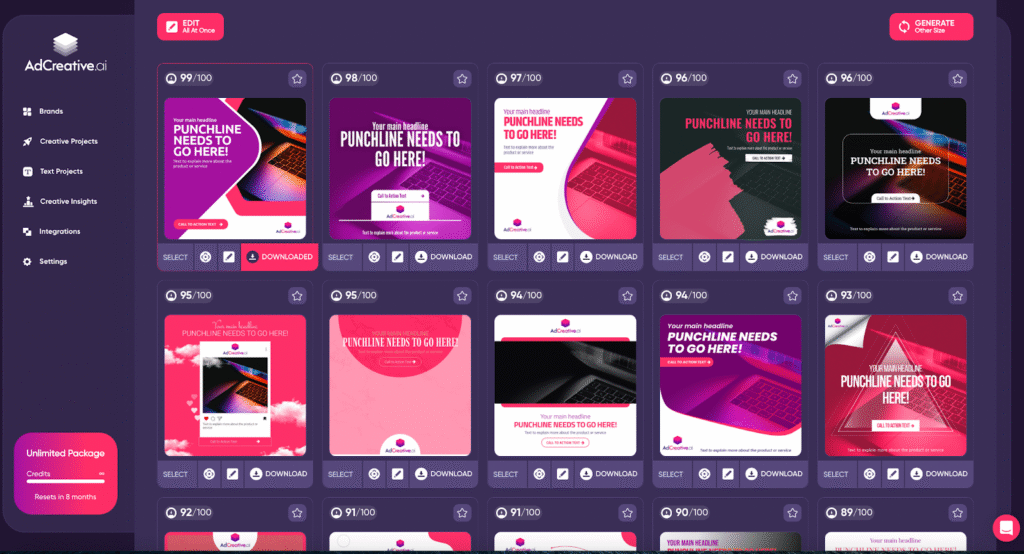
AdCreative.ai is an AI-first ad creative platform. It generates banners, short videos, ad copy, and product “AI photoshoots” for ecommerce and performance marketers. It also offers creative scoring to predict which assets will work before you launch. If you need many variants quickly across Meta, Google, TikTok, and display, this tool is a solid “production engine.”
My take: treat it as your rapid output layer, then pair with your own testing and brand QA to avoid sameness.
features:
- Ad creatives in many formats with fast multi-size output for common placements.
- AI product photoshoots to transform basic product shots into styled visuals for ads. Helpful if you lack studio capacity.
- Short video generation for social and performance ads.
- Ad text generator trained on ad copy best practices for headlines and CTAs.
- Creative scoring to pre-score assets (performance and awareness scores) before spend.
pros:
- High output velocity. You can fill a testing matrix (angles × offers × sizes) in hours, not weeks.
- Breadth of tools (copy, images, video, upscaling, background removal) reduces your app sprawl.
- Creative scoring gives you a starting point for prioritizing. It’s not a replacement for live tests, but it points you to likely winners.
cons:
- Credit/download limits on lower tiers can throttle larger programs. Budget for higher plans if you run many tests.
- Brand governance is lighter than enterprise platforms. You must enforce your voice and claims with checklists and human review. (Editorial guidance based on product focus.)
- Some users report billing and trial confusion on marketplaces/review sites. Read plan terms and watch renewals.
price:
- Public SaaS listings commonly show Starter around $39/month and Professional around $249/month, with higher tiers up to $599/month and free trials available. The vendor site often runs promotions; confirm current limits (credits, downloads, users) before you commit.
Anyword – Gen AI Copy Optimizer
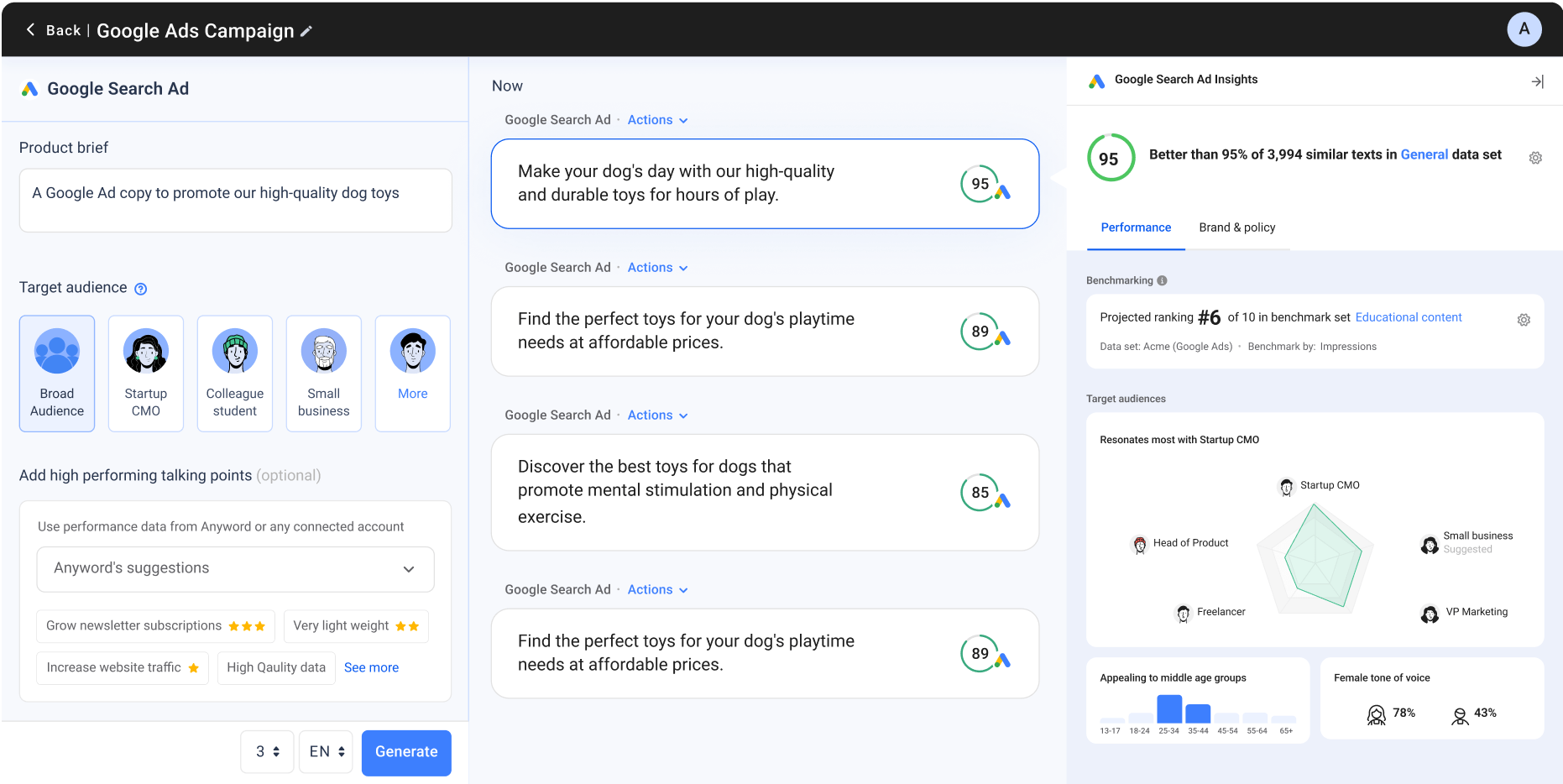
Anyword is built for performance-driven content. Its signature is the Predictive Performance Score that estimates which variation will likely win before you publish. If you care about conversion metrics and want a scoring loop in your writing tool, this is compelling.
I’ve seen it help teams prioritize copy variants for ads and landing pages, then carry those learnings into blog intros and CTAs.
features:
- Predictive Performance Score. A 0–100 score trained on marketing outcomes to flag likely winners across channels.
- Data-Driven Editor. Real-time guidance while you edit. Helps you iterate to a higher score.
- Content Intelligence. Pull performance data from your channels and benchmark new copy against past winners.
- Website messaging testing. Simultaneously test multiple variations and personalize by intent.
pros:
- Prioritize variants before spend. Useful when budgets are tight.
- Feedback loop improves consistency across ads, email, and site copy.
- Plays well with a performance culture where you report on lift, not just volume.
cons:
- Scores are guides, not guarantees. You still need live tests and holdouts.
- The best value lives in higher tiers where you connect past performance data; plan for onboarding time.
price:
- Starter: listed around $39/mo (yearly) on third-party and mirrored on Anyword’s pricing page with annual discounts.
- Data-Driven: around $79–$99/mo (yearly discount), more seats and real-time predictions.
- Business/Enterprise: custom pricing with larger data connectors, custom models, SSO, and API. Always verify current pricing on the official page.
FeedHive – Gen AI Social Media Writer
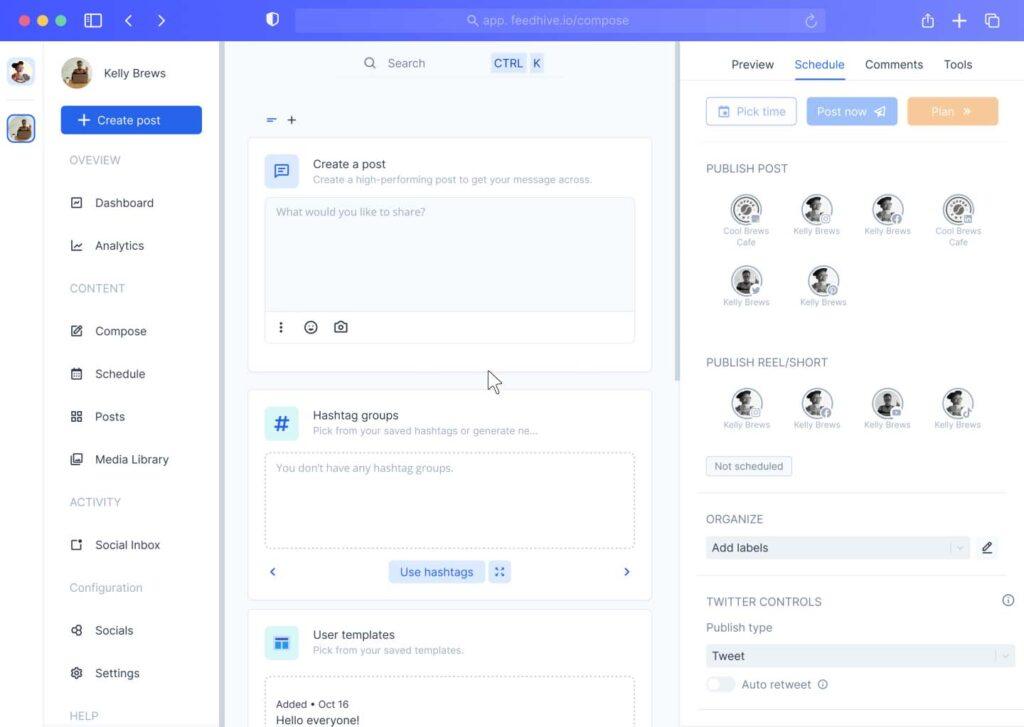
what it is (and a bit of personal experience & opinion):
FeedHive is an AI-forward scheduler that also helps you ideate, write, and automate. It covers publishing to all major socials with a built-in AI writing assistant and “vibe” workflows that learn your style. It feels lightweight and fast.
If you want a modern scheduler with real AI inside (not just an “AI button”), this is it. I like it for teams that post daily and want auto-rules, grid planning, and quick approvals.
features:
- AI Writing Assistant tuned for social. It suggests ideas, improves drafts, and adapts to platform norms.
- Vibe Marketing to keep tone consistent with your brand and audience.
- Automation rules (e.g., auto-comment when a post passes a threshold).
- Smart scheduling and cross-posting with channel-specific tweaks.
- Collaboration & approvals, social inbox, analytics, grid preview, and white-label options for agencies.
pros:
- Fast to adopt. You’ll ship content day one and refine automation later.
- All-in-one for daily ops: ideate, schedule, reply, and report without tool-hopping.
- Useful automation for performance nudges (follow-up comments, recycling). Feels like extra hands on the team.
- Broad channel coverage including Reels/Stories, Shorts, Threads, and Google Business.
cons:
- Governance is lighter than enterprise suites. You must enforce tone/claims with your own checklist.
- Some advanced needs (complex approvals, multi-brand policy gates) still call for heavier platforms.
- As with any scheduler, recycled posts can look repetitive if you don’t curate the variants. FeedHive gives the feature; you still need judgment.
price:
- Public pricing shows four tiers: Creator, Brand, Business, Agency. Typical monthly rates range from $19/€19 up to $299/€299, with a free trial. Currency and inclusions vary by region. Check the official pricing page for current limits (socials, workspaces, posts).
SEO.AI – Gen AI Seo Writer
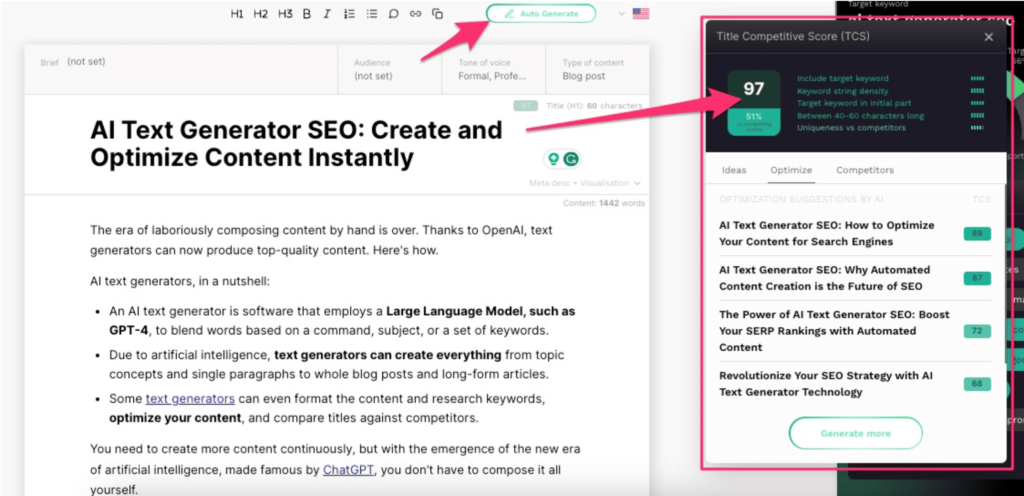
SEO.AI is a purpose-built AI platform for SEO writing and on-page optimization. It blends an AI writer with real SEO signals (SERP analysis, GSC data, internal linking) so you can draft and optimize in one pass.
When I’m helping teams reduce “brief → draft → optimize” handoffs, SEO.AI is one of the few tools that actually closes the loop inside a single editor. It’s strongest when you feed it your brand voice and connect Search Console so the suggestions aren’t generic.
features:
- AI SEO editor with real-time SEO Score that tells you what to fix as you write.
- Brand voice training so drafts match your tone and structure.
- Keyword research + semantic SEO (NLP) and content benchmarking against top results.
- One-click fixes for missing keywords, meta tags, and automated internal linking.
- Search Console integration for keyword gaps and performance insights pulled from your site.
- Bulk generation for programmatic content and product feed optimization for ecommerce.
pros:
- Cuts time from brief to publish with score-driven edits in the same canvas. Your writers don’t have to bounce between tools.
- The GSC + gap view keeps content grounded in real queries you already surface but under-serve.
- Brand voice controls reduce the “AI sameness” that hurts engagement and trust.
cons:
- You’ll still need human fact-check and EEAT passes. The editor helps with structure, not claims.
- If you skip brand voice setup, outputs can feel generic despite strong on-page signals.
- “Unlimited” style wording lives under fair usage; heavy teams should confirm limits.
price:
- Basic: $49/mo (1 seat; 1 site/project).
- Plus: $149/mo (3 seats; unlimited sites/projects; adds Keyword Gaps, custom templates, higher limits).
- Enterprise: $749/mo (5 seats; larger limits; onboarding and priority support). Annual options shown with different totals. Always verify your inclusions and usage caps on their pricing page.
Copy.ai – Gen AI Content Writer

what it is (and a bit of personal experience & opinion):
Copy.ai is an AI-native workflows + agents platform aimed at GTM teams. Think of it as a layer where you codify your content processes (research → brief → draft → distribute) and run them on demand.
I like it for teams that have repeatable motions—SEO articles, product updates, translations—and want to ship with fewer tabs open. Its “Workflows” and “Content Agents” are the draw, not just a chat box.
features:
- Workflows. Chain actions (research, scrape, generate, rewrite, format) into a reusable pipeline. Great for briefs and production sprints.
- Content Agents. Train agents to follow your steps and brand rules for specific outputs (e.g., “SEO article for feature X”).
- Brand Voice, Tables, Actions. Keep voice consistent and store structured data to feed into content at scale.
- Model choice. Access to multiple leading models within the same workspace.
pros:
- Automation-first. You reduce manual copy/paste across tools.
- Clear scale path: start with “Chat,” then graduate to “Agents” and higher workflow credits.
- Good fit for teams running the same content pattern across 10–100 items per month.
cons:
- Output quality still depends on your process design. Weak prompts or missing data = weak drafts.
- Workflow credits can constrain heavy users if you underestimate volume.
price:
- Chat: from $29/mo (or $24/mo billed annually).
- Agents: from $249/mo (10k workflow credits/month).
- Growth/Expansion/Scale tiers add seats and credits ($1,000–$3,000/mo).
HeyGen – Gen AI Video Generator
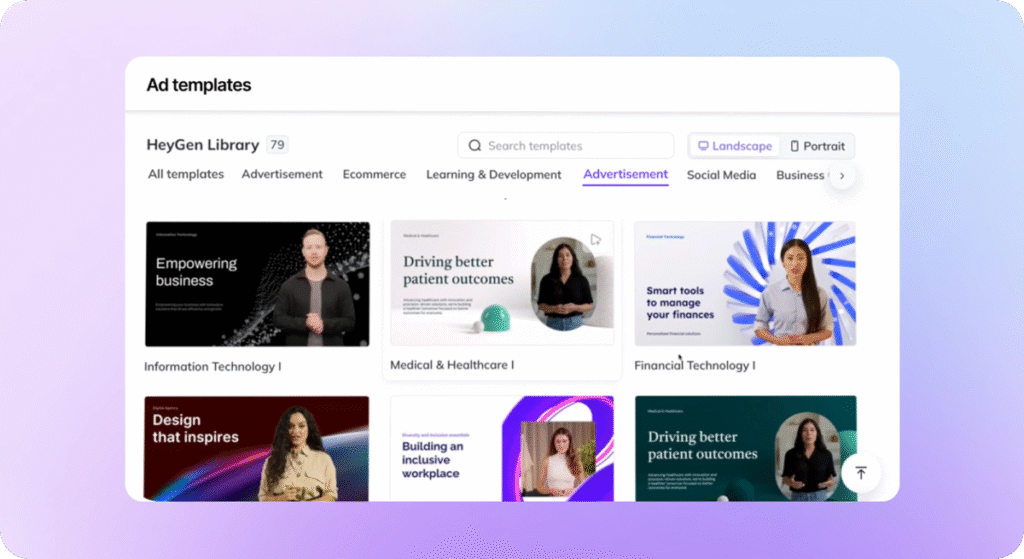
HeyGen is an avatar + translation video studio with quick outputs. It shines for sales intros, product explainers, and fast multilingual spots. I like HeyGen when you want a lighter UI than Synthesia, plus aggressive feature velocity (translation minutes, custom interactive avatars).
features:
- Avatar video generation with stock or custom avatars; interactive avatar options on Creator+.
- Video translation minutes included on paid plans; 175+ languages and dialects.
- Free plan with 3 videos/month to test the workflow.
pros:
- Fast to produce personalized clips for email and landing pages.
- Built-in translation reduces post-production.
- Good library of stock avatars if you don’t want to record.
cons:
- Outputs can feel templated if you skip scripting and b-roll.
- Heavier brand guardrails (legal/claims) require your own review layer.
- Translation minutes and avatar minutes need planning per campaign.
price:
- Free tier available; paid plans list monthly rates and inclusions (e.g., Creator plan with custom avatar, 1080p export, translation minutes). Check the official pricing page for current limits.
ElevenLabs – AI Video Translator
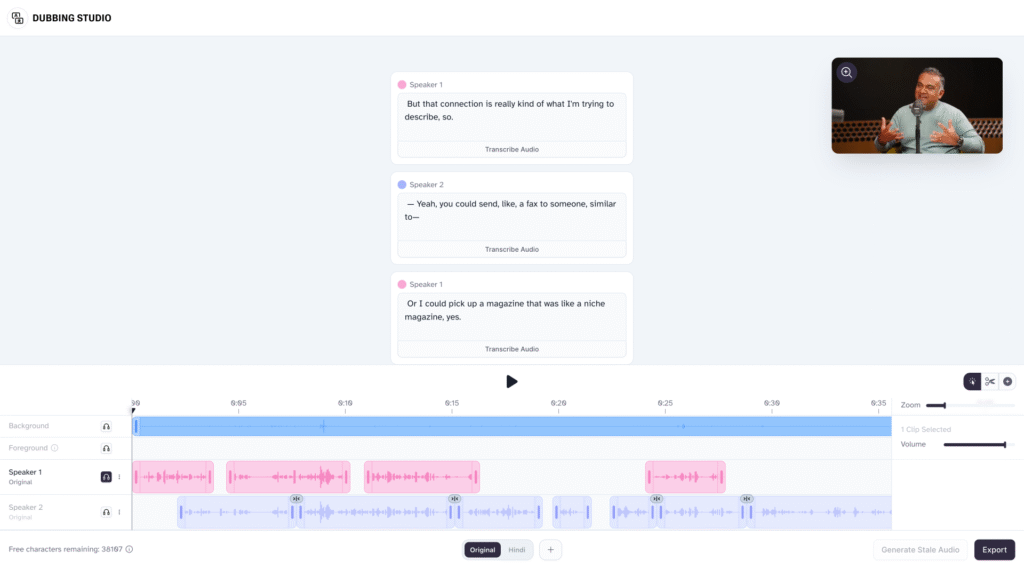
ElevenLabs is an AI voice platform. Use it for high-quality voiceovers, dubbing, and multilingual content. I like it for ad VO, product videos, and international versions. Quality is strong, and the product moves fast (new agents, music, and dubbing upgrades). It’s become a default choice for voice in our creative kits.
features:
- Text-to-Speech, voice cloning, agents, music, and automated dubbing in 30+ languages. API included on paid and even free tiers.
- Dubbing Studio with per-minute pricing; watermark vs. no-watermark options.
pros:
- Broadcast-ready VO in minutes.
- Flexible licensing tiers for teams and agencies.
- Dubbing workflow scales localization without separate studios.
cons:
- Character/minute quotas require capacity planning.
- Brand-safe voice use still needs consent and policy discipline.
- Some expressive control requires prompt skill or multiple takes.
price:
- Free tier with credits; paid Starter/Creator/Pro/Scale tiers scale character limits and commercial rights. Dubbing is per-minute (different rates for watermarked vs. non-watermarked output). See pricing tables for exact limits.
Byword – Gen AI Programmatic SEO
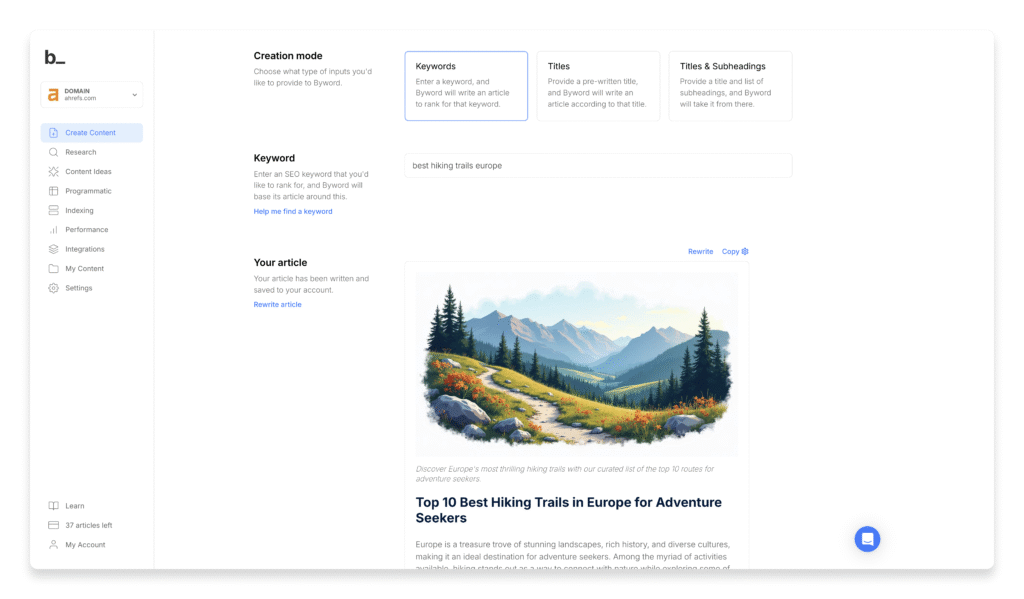
Byword is an AI-native programmatic SEO writer. Its focus is simple: generate high-quality articles at scale from keywords, templates, or feeds. If you run a topic cluster strategy, or you need thousands of consistent pages, Byword is built for that.
My take: it shines when you bring a strong taxonomy and internal-linking plan. Use it to produce first drafts fast, then edit for depth and EEAT.
features:
- Bulk/article generation. Create single pieces or spin up large campaigns with custom structures.
- Templates & formats. Enforce consistent headings, sections, and metadata across clusters.
- Credits & plans designed for scale; clear per-article economics.
pros:
- Throughput. Ideal for filling long-tail gaps and support content quickly.
- Predictable unit cost per article helps you forecast.
- Lightweight learning curve compared to heavier suites.
cons:
- It’s an article engine, not a full content OS. You still need external QA, fact-checks, images, and internal links.
- If you don’t bring a solid brief or outline, outputs can read generic. (True for any generator, but scale magnifies it.)
price:
- Pay-as-you-go: from $5/article.
- Starter: $99/mo (25 articles).
- Standard: $299/mo (80 articles).
- Scale: $999/mo (300 articles). Check the live page for current inclusions and research-report credits.
Photoroom – Gen AI Product Studio
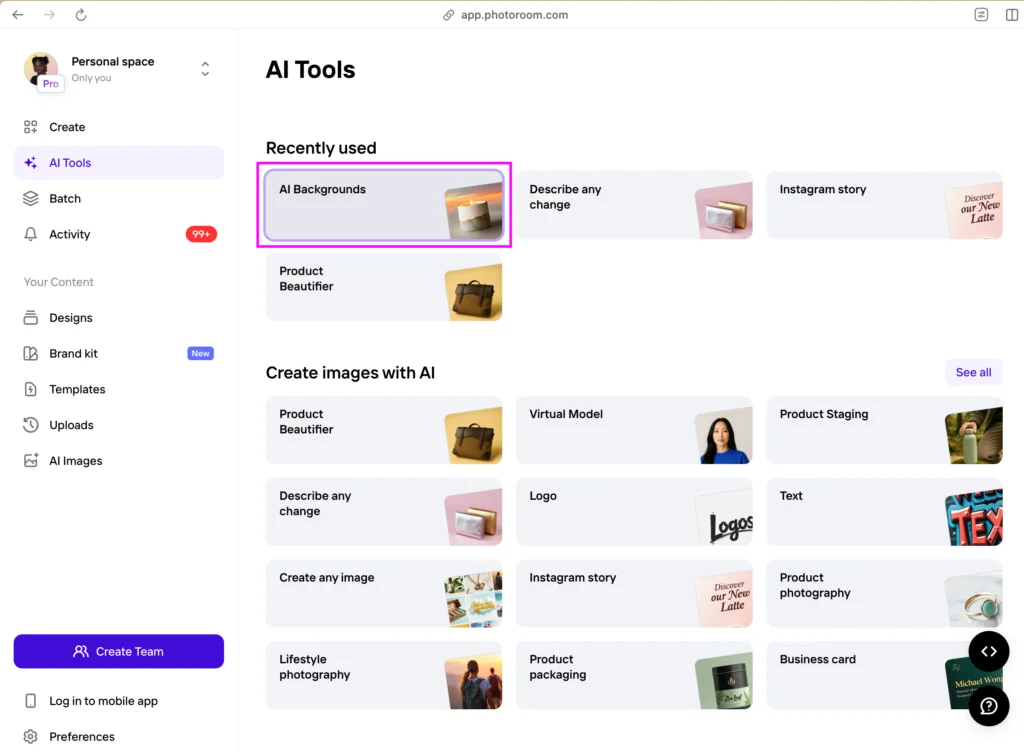
Photoroom is an AI image studio used by marketplaces, resellers, and SMB brands. It combines background removal, product staging, virtual models, batch edits, and an API. If you need to clean, standardize, and scale product imagery for listings and ads, this is a workhorse. I recommend it when your team handles large catalogs or multi-channel merchandising.
features:
- Background remover, AI backgrounds/images/shadows, retouch, and resize.
- Product Staging and Virtual Model to place items in realistic scenes.
- Batch Mode (up to 50 or 250 images depending on plan), Teams, and API for automation.
- Enterprise options: SOC 2 Type II API, safe-model posture, and priority support.
pros:
- Ideal for catalog scale work and marketplace standards.
- Bridges creator needs and ops automation (API + batch).
- Strong upgrade path from solo to enterprise.
cons:
- Creative flexibility is good, but heavy art direction still belongs in a design app.
- Pricing is tiered by features and export limits; forecast usage to avoid surprises.
- High-volume teams should test API throughput before committing.
price:
- Plans are listed as Free, Pro, Max, and Enterprise with different limits (exports, batch size, advanced AI access). The public page focuses on features, not fixed dollar amounts; contact sales or check in-app for your region’s pricing.
Mutiny – Gen AI Website Perzonalization
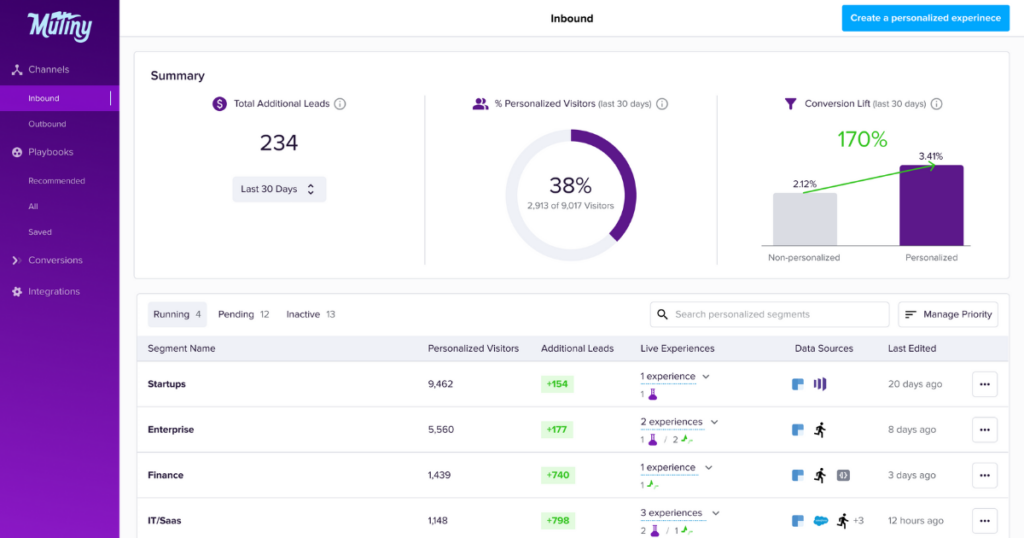
Mutiny is a no-code, AI-driven website personalization platform for B2B growth. It lets you turn intent signals into on-site experiences and even auto-draft LinkedIn ads you can push live. If you run ABM or want pipeline from mid-funnel traffic, Mutiny helps you personalize pages without engineering.
In my audits, teams get the most from Mutiny when they feed it clear ICP segments and pair it with tight sales follow-up.
features:
- AI copy + experiences you can ship by segment (firmographic, account lists, industries).
- LinkedIn activation: draft creative in Mutiny and launch to LinkedIn.
- Playbooks and testing with audience reveal (e.g., Clearbit) and statsig-style significance checks.
pros:
- Fast on-site wins without developers.
- Strong B2B/ABM fit; plays nicely with sales motions.
- Bridges on-site + ads, so you keep message match across the journey.
cons:
- Best for B2B and higher ACV funnels; light e-commerce tooling.
- You still need clean segments and offer strategy or results stall.
- Reporting is conversion-focused; deeper attribution needs your analytics stack.
price:
- Custom. Mutiny sells by package and usage; public pages don’t list hard prices. Third-party marketplaces confirm quote-based plans.
Blueshift – Gen AI CDP
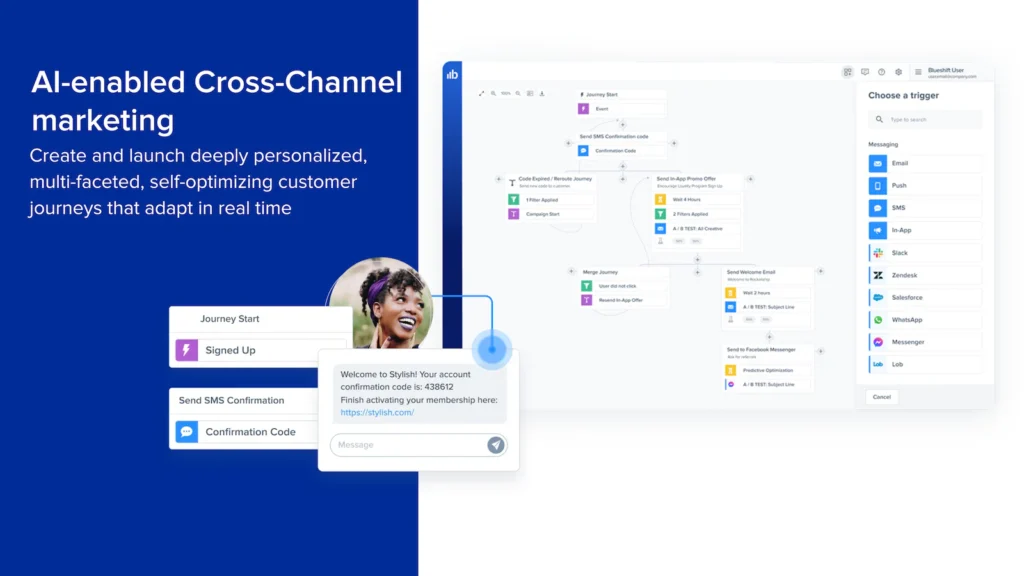
Blueshift is an AI-native customer engagement platform that combines CDP-style data, journey orchestration, and predictive + generative + agentic AI. If you want one hub for email, push, in-app, and web that actually uses AI beyond a “content button,” this is a serious option.
I’ve seen it replace a patchwork of ESP + CDP + recommendation tools for mid-market teams that need speed and 1:1 targeting.
features:
- Customer AI: predictive segments, next-best action, and content recommendations.
- Omnichannel orchestration with holdouts and testing built in.
- Agentic/generative helpers for copy and images tailored to segments.
pros:
- AI is built-in, not bolted on. You can go from data to campaigns fast.
- Good balance of predictive intelligence and creative assistance.
- Holds up when you scale channels and audiences.
cons:
- Heavier platform than point tools; expect onboarding time.
- You’ll still need a data owner to keep schemas clean.
- Best features sit behind annual plans.
price:
- Starter plans publicly listed from ~$1,250/month (annual); other pages show variants by module. Always confirm inclusions.
Spectrm – Gen AI SMS & DMs Writer
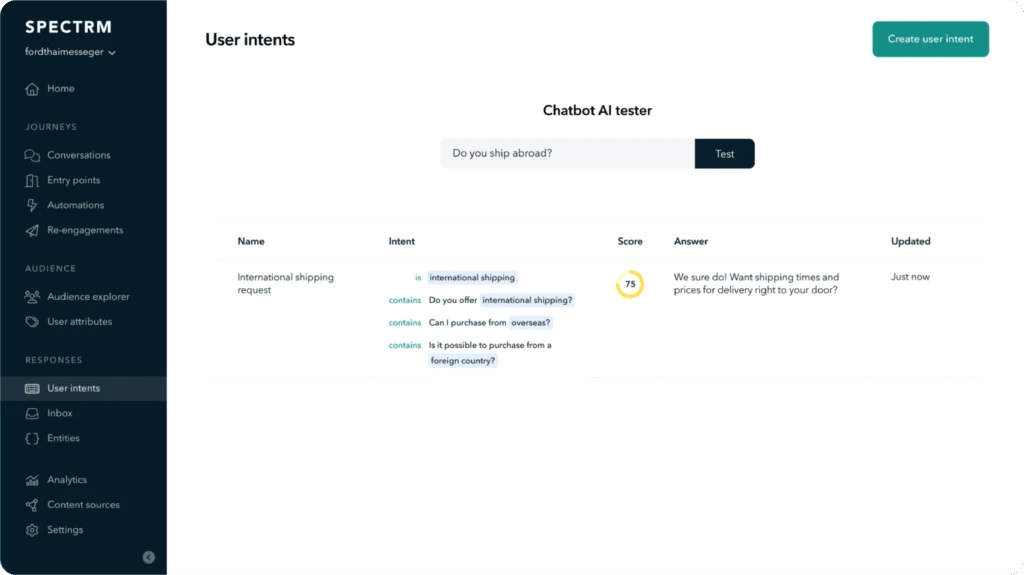
Spectrm is a conversational marketing platform that runs LLM-level bots on WhatsApp, Messenger, Instagram DMs, and web chat. It’s built to collect declared data, personalize recommendations, and re-engage with notifications.
If you rely on paid social or WhatsApp as a revenue channel, Spectrm lets you turn clicks into two-way conversations and lifecycle flows. I’ve seen brands use it to capture zero-party data faster than forms—then push segments to ads and email.
features:
- Gen-AI chatbots that guide shoppers, recommend products, and collect preferences.
- Multi-channel messaging across WhatsApp, Messenger, Instagram; re-engagement campaigns with notifications.
- Zero-party data → CRM/ESP sync for downstream campaigns.
pros:
- Captures rich data in minutes, not weeks, via chat.
- Works where your audience already messages, improving response rates.
- Strong for paid-to-DM funnels and list growth.
cons:
- Messaging compliance and opt-in rules require discipline.
- Creative and bot design matter; expect copy work up front.
- Best results come with ongoing optimization (treat it like a channel).
price:
- Quote-based. Pricing varies by channels, languages, and service package. Public sources and vendor pages emphasize custom quotes and ROI modeling, not fixed tiers.
Recraft – Gen AI Visual Generators
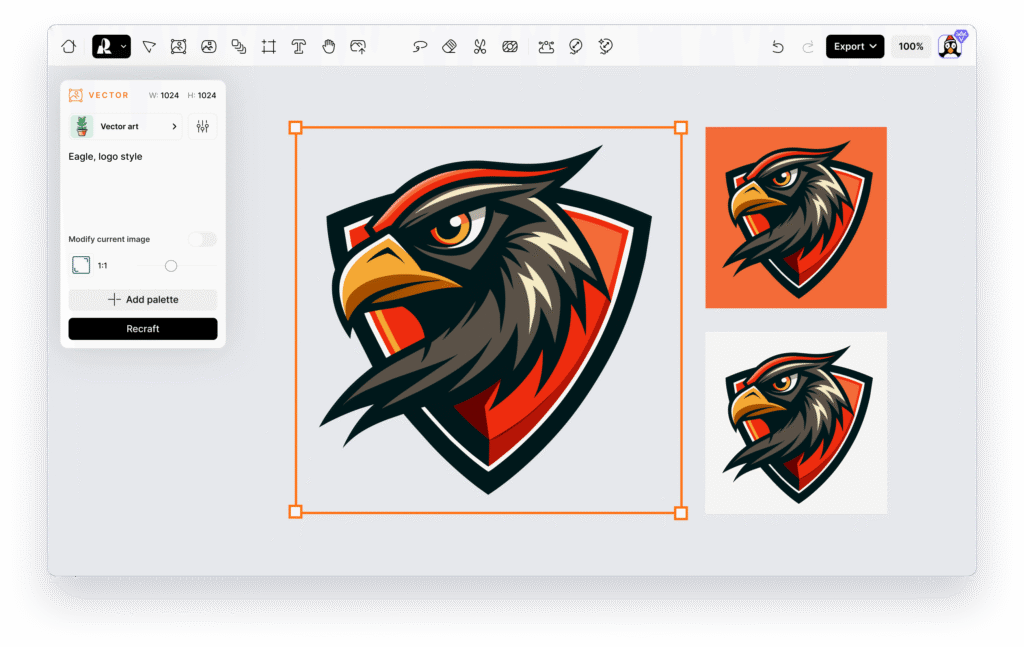
Recraft is an AI-native vector and raster design tool. It generates logos, icons, illustrations, posters, and branded assets—and exports clean SVG. If you ship a lot of graphics for ads, landing pages, and social, Recraft is a timesaver. I like it for brand-consistent icon sets, quick hero graphics, and editable vectors you can hand to designers.
features:
- AI vector generator with SVG export; also supports raster generation and editing.
- Daily free credits, with top-ups and subscriptions for heavier use.
- Focus on brand consistency and designer-friendly outputs (vectors that aren’t a mess).
pros:
- Real vector workflows. You can scale and tweak in your design stack.
- Ideal for ad variants where you need many sizes fast.
- Lower learning curve than traditional illustration.
cons:
- You still need a design eye. AI can draft, but layout and brand finesse are on you.
- Advanced art direction may require several passes and manual edits.
- Credit cadence means you plan production days.
price:
- $0 starter with daily 30 free credits; paid plans and top-ups add capacity. See the official pricing page for current inclusions.
ChatGPT (Business / Enterprise) – All-in-on Gen AI Content Generator
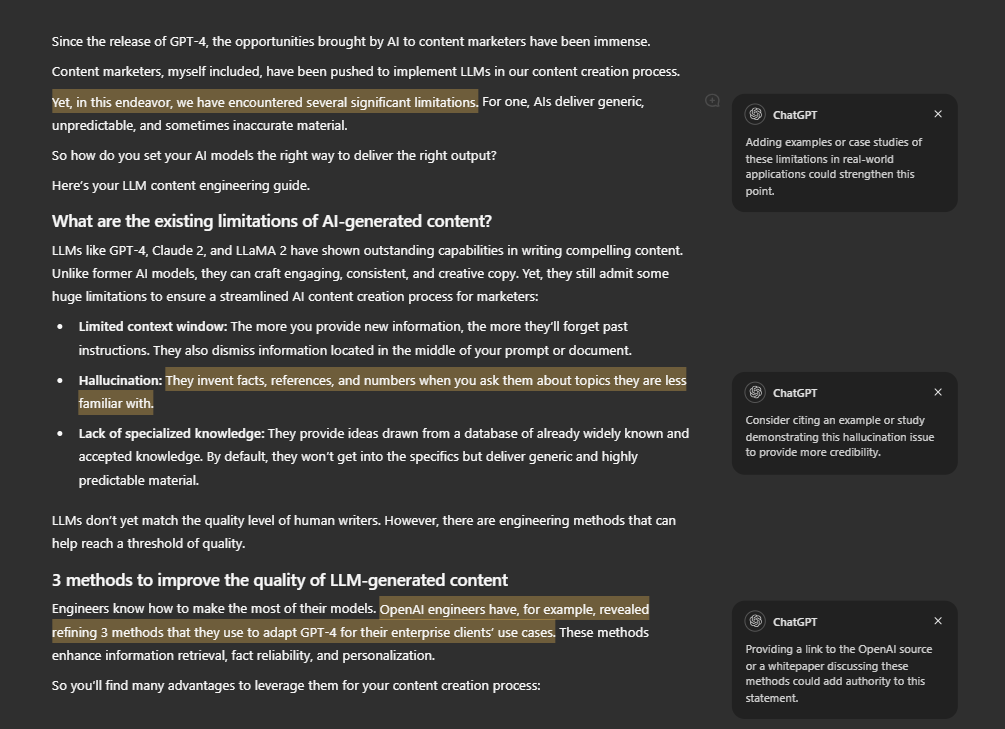
ChatGPT is a general AI workspace for research, briefs, drafts, sheets help, and light analysis. The Business plan gives you an admin-controlled environment with modern connectors and projects, while Enterprise adds deeper security controls and data residency. In day-to-day content ops, it shines when you centralize brand voice, reference docs, and prompt libraries inside Projects and use Data Analysis for sheet wrangling. In my experience, non-technical marketers adopt it fast, and PMs love the “one tab for everything” feel.
features:
- Business workspace with SAML SSO, MFA, and admin console; usage is excluded from training by default.
- Enterprise upgrades: SCIM, role-based access controls, usage analytics, compliance API, and data residency.
- Connectors (Drive, SharePoint, Notion, GitHub, etc.) plus Projects, Tasks, Canvas and Deep Research for longer, cited digests.
- Enterprise privacy commitments: you own your inputs/outputs; OpenAI doesn’t train on business data by default.
pros:
- Fast ramp for non-technical teammates.
- Secure, admin-managed space with sensible defaults.
- Strong all-rounder: research → briefs → copy → spreadsheet help in one flow.
cons:
- Governance features like data residency and advanced admin live on Enterprise, not Business.
- You’ll still need brand guardrails (style guide, claims list) inside Projects to prevent drift.
- Deep Research is powerful, but quality depends on the sources you point it to.
price:
- Business: $25/user/month (annual) or $30/user/month (monthly).
- Enterprise: quote-based; adds SCIM, RBAC, analytics, data residency, SLAs.
Clay – AI Agent Lead Generation
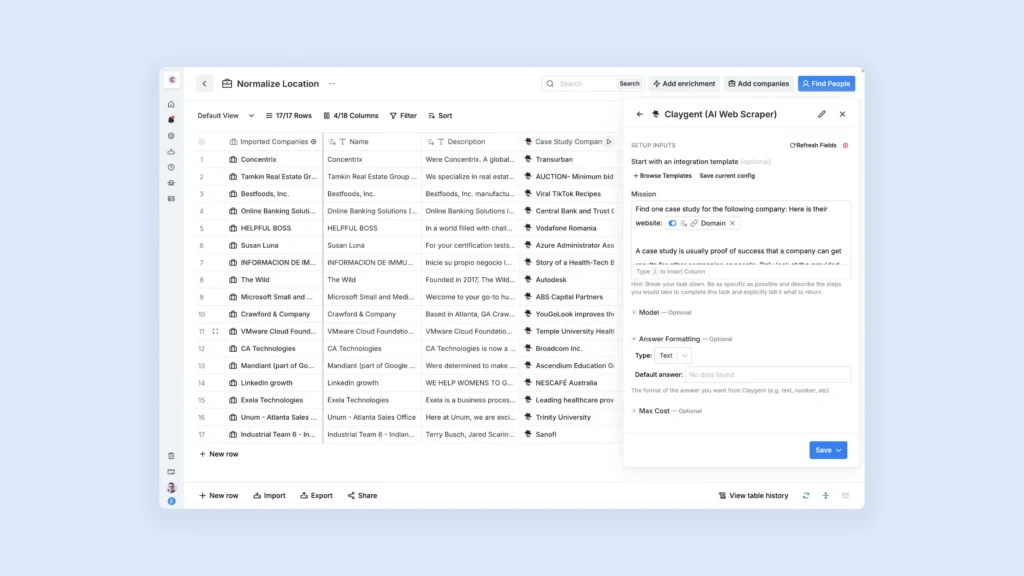
Clay is a growth OS built around agents for research, enrichment, and message drafting. You compose a table, wire 100+ data sources, and let Claygent do the fuzzy work—site scraping, QA, and first-pass personalization. I reach for Clay when you need “one place” to source, enrich, score, and personalize at scale without duct-taping five tools. When you set clear rules, Clay becomes your repeatable GTM engine.
features:
- AI research agent (Claygent) to read websites, summarize value props, and extract details you’d normally brief an SDR to find.
- Multi-provider enrichment and web scraping in one pipeline; 100+ providers at wholesale pass-through.
- Personalized copywriting and AI formula generator for first drafts that pull from your enriched fields
- Scheduling, webhooks, CRM & sequencing integrations so you can push lists and messages where work happens.
pros:
- Real agentic research reduces manual prospect research and keeps your personalization consistent.
- Credits + pass-through data model means you’re not locked into one data vendor. Costs stay predictable.
- Scales from scrappy to enterprise without rebuilding your stack. Governance is decent once you standardize columns and prompts.
cons:
- Clay shines when you define good schemas (columns, logic). If you skip that, results vary.
- Message quality still depends on your angle library and proof. Agents won’t invent strategy.
- The table metaphor can feel “ops-heavy” at first. Budget time to build your first robust template.
price:
- Free (100 credits/mo). Starter listed at $149/mo; Explorer at $349/mo; Pro from $800/mo; Enterprise custom. Annual billing grants all credits upfront; monthly includes 2× rollover. All tiers include AI/Claygent; higher tiers add API/webhooks/CRM integrations and larger search limits.






